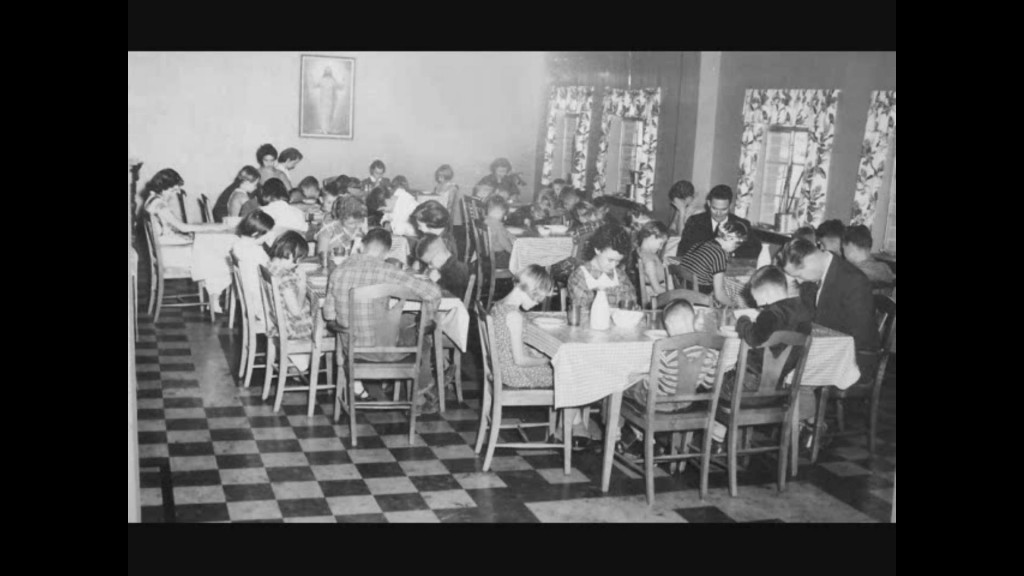
 East Tennessee Christian Home and Academy was started in 1946 after Preacher Fred Smith of First Christian Church in Elizabethton, TN witnessed a local judge placing children in jail because they did not have a family to provide for them. With no facility in the community to care for them Preacher Smith and a leadership board of 14 members opened ETCHA on a beautiful 18 acre property that overlooks the surrounding mountains and valleys.
East Tennessee Christian Home and Academy was started in 1946 after Preacher Fred Smith of First Christian Church in Elizabethton, TN witnessed a local judge placing children in jail because they did not have a family to provide for them. With no facility in the community to care for them Preacher Smith and a leadership board of 14 members opened ETCHA on a beautiful 18 acre property that overlooks the surrounding mountains and valleys.
During the past 70 years the ministry has seen many changes. In the beginning, Preacher Smith was the Supervisor and First Christian Church was the sole financial supporter. Later other Christian Churches and Churches of Christ were invited to make financial donations and other men hired to provide administrative leadership.
In the 1980’s, a financial decision was made by the Board of Directors to contract with the Tennessee Department of Children’s Services to admit up to 18 children/youth who were in state custody. Several hundreds of these children/youth were well served, ministered to about Christ’s love, and helped to become successful, productive citizens.
During the more than twenty years that ETCHA cared for children/youth in state custody there were no problems with the Christian environment of the program. However, in November, 2003, ETCHA received a telephone call that the contract had been “red flagged” because of the “Spiritual Growth Policy” which states that residents would attend church regularly.
In order to continue with the contract, the policy would need to be changed. No longer would mandatory church attendance be permitted. A child could refuse to attend church and other arrangements would have to be made or they could choose to go to an Atheist group or any other type of church and arrangements would have to be made for this. The Department of Children’s Services halted admissions until the policy was revised.
Because the ETCHA Board of Directors feared that the 4 residents who were scheduled for graduation the following May would be transferred, the policy was revised on paper to be very vague and practice of regular church attendance continued because none of the residents objected to attending church. All the while, the Board of Directors was praying for guidance in making a decision about continuance of the program.

2004 became a pivotal year for ETCHA. In February, 2004, a second call for a major change by the Department of Children’s Services was received. They wanted all children/youth receiving the Level 1 care at ETCHA to be placed in a foster home and all contracts with Level 1 residential services providers would be discontinued. ETCHA was given the options of revamping its programs to become a Level 2 or higher provider or to only participate in foster home care for Level 1 children/youth.
With great urgency the Board of Directors and Staff Leadership reviewed the options:
1) Gear up ETCHA to become a Level 2 or higher program and do away with the current mission and programs as well as continue to build the struggling foster care program;
2) Close the doors of ETCHA and disburse the assets to other programs;
3) Develop a downsized program with the existing private donations and admit privately placed non-custodial children/youth.
The following was an agonizing couple of months as prayers were lifted up and consideration given to the options. With trust and faith in God, the choice was unanimously made to continue providing services with the anticipated donations from churches, individuals and community groups. Using a budget for those monies, decisions were made to:
1) Admit eight 8 at-risk adolescent girls to be housed in the dormitory area of the original building (Upper Room) with a commitment for a 1 year stay;
2) Change staffing patterns and job functions and reduce several full-time positions to part-time;
3) Maintain the 3 foster homes for children in state custody until the end of the contract year; and
4) Use the Accelerated Christian Education curriculum for an on-campus academic program.
The foster care contract was not renewed because all referrals received from the Department of Children’s Services were those that were not acceptable to the DCS’s foster homes and required greater that Level 1 service.
On June 30, 2004, goodbye was said to the last youth in state custody. All four seniors had graduated with honors. Work began immediately to renovate the Upper Room dormitory areas and to get the word out to all established supporters that ETCHA would continue provide care for children/youth on a reduced scale. The first privately placed resident was admitted on August 14, 2004. She was a 15 year old girl, named Sarah. During the first 6 months of the redesigned program, only 3 at-risk adolescent girls were admitted. Referrals were slow to come in because most of the community agencies that historically made referrals thought ETCHA was closed like so many other residential programs across Tennessee because of the drastic changes implemented by DCS.

Much effort went into letting referring agencies know that ETCHA was “alive and well”. In conferencing with other Christian providers of residential programs across the country, ETCHA learned that it would take approximately 5 years for a full census to stabilize. Praising God, ETCHA obtained and maintained a full census in 2008—after only four years instead of the usual five years. Currently, ETCHA averages 2-3 referrals each week. The services are in great demand in the area.
The local courts have been impressed with the successes of the girls in care and often give parents a choice to admit their daughter to ETCHA as an alternative to placing her in state custody. There is a great need in the community to reopen the remaining two dormitories on campus. Because the education component is a vital part of the redesigned residential program the name was expanded to East Tennessee Christian Home and Academy (ETCHA).
Since 2004, ETCHA has served forty 40 at-risk adolescent girls and their families. The Accelerated Christian Education curriculum has become a strong aspect to ETCHA’s program. Of the forty served, five 5 have graduated with a high school diploma. Others have chosen to take the GED examination. The first graduate joined the Army with the intention of getting a college degree. She was injured, returned to Johnson City, works and is a full-time student at East Tennessee State University.
Another graduate became a Certified Nursing Assistant and looks forward to working with the elderly when she has transportation to get to work. In the meantime, she works in the classroom as a mentor for the residents. Some residents have stayed only the required one year and have successfully transitioned back into their homes and public schools. Others have found such success in ETCHA’s academic program that they have continued their education as a Day Student. Advancement of reading skills and math skills has been validated with national standardized testing.
The residents receive daily affirmation of the work they complete and learn valuable goal-setting skills. The best results are that most have been baptized while at ETCHA and that all have returned to their community without further judicial problems. The residential program has also made tremendous gains over the past few years. The House Parent positions, the backbone of the program, are stable and role model strong Christian beliefs and behaviors. The girls are placed in “individual growing seasons” that help them to set goals in all areas of their lives; thus, the motto, “Growing Girls God’s Way”.

Each month all girls attend focus groups where character traits important for successful living are discussed. These traits include purity, joy, and perseverance. In addition, scripture verses are memorized and must be recited during individual monthly reviews of progress. A daily schedule of activities is followed. The Behavior Management Policy operates on a system of demerits and fines for negative behaviors and merits and incentives for positive behaviors. Those who receive less than 2 demerits during the month are treated to a special outing. This policy has been very successful in behavioral management for ETCHA.
Over the past 67 years hundreds of children and youth whose families could not or would not provide them with an environment that nurtured their development have been served. Many have returned to their communities and become productive successful citizens. The programs of service have evolved from the original concept of an orphanage to its present day residential and academic programs for adolescent girls who can benefit from an enhancement of their life experience. In a perfect world, ETCHA’s ministry would not be needed. However, numerous adolescent girls are being challenged by their environment and they and their families are in need of respite and/or reprieve.
ETCHA provides enhancement in the following areas:
FAMILY LIFE
SOCIAL AND EMOTIONAL GROWTH
ACADEMICS
SPIRITUAL LIFE
